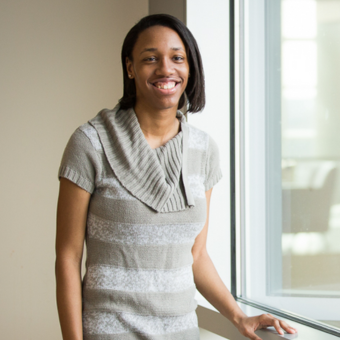Adrianna Shy
 Adrianna Shy’s research into stem cells aims to provide a potentially viable route to reducing the risks of life changing therapeutic treatments.
Adrianna Shy’s research into stem cells aims to provide a potentially viable route to reducing the risks of life changing therapeutic treatments.
A lot of existing medical options for serious illnesses are limited to the treatment and management of the disease. Numerous diseases such as Alzheimer’s, many cancers, and Parkinson’s can be treated, but not cured. Stem cell research aims to provide a solution that cures such diseases.
iPSCs, or induced pluripotent stem cells, are a type of stem cell which are created by taking a body cell and turning it into a stem cell. However, one drawback with this method is the risk of tumor formation as a result of the process. The production of these stem cells from our own cells creates what are called undifferentiated iPSCs – which can lead to cancers.
As a 5th year PhD student in the lab of Prof. Bing Xu, Adrianna is very much part of the efforts in the recent breakthrough that looks at eliminating the formation of such tumors.
The solution involves making use of an enzyme produced in excess
by iPSCs to selectively kill undifferentiated iPSCs (the potential tumor
cells), while being harmless to normal cells.
Adrianna’s involvement with the project began through Brandeis Innovation’s National Science Foundation I-Corps program, a rigorous 7-week training program that helps to cultivate new ideas, business models and commercial viability at Brandeis.
Following her time as an I-Corps Fellow, Adrianna and her team took part in the Sprout competition, Brandeis Innovation’s funding program aimed at accelerating bench research. They won funding through the Sprout program as well, marking another key milestone. Through both programs, Adrianna got to network with businesspeople, developing an invaluable insight into building a start-up and running a business. It is an aspect of being part of the Brandeis Innovation programs that she never realized she would enjoy so much, she notes. Further, the programs taught her how to communicate with a range of stakeholders, from fellow experts to potential investors. Cultivating those different skills has certainly enabled her to better communicate the science to those outside of her discipline.
Being part of I-Corps and Sprout has helped Adrianna add business skills to her repertoire. This has made it easier to bridge the gap between the business world and the lab. “As a scientist who spends so much time in the lab doing work, it’s sometimes kind of hard to communicate that to other people. Figuring out how to communicate that to people who aren’t in Chemistry or Biology, communicating that to investors, has been a tremendous benefit of being part of Brandeis Innovation.”